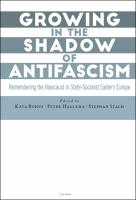Growing in the Shadow of Antifascism
Remembering the Holocaust in State-Socialist Eastern Europe
Contributor(s)
Bohus, Kata (editor)
Hallama, Peter (editor)
Stach, Stephan (editor)
Collection
Knowledge Unlatched (KU)Language
EnglishAbstract
Reined into the service of the Cold War confrontation, antifascist ideology overshadowed the narrative about the Holocaust in the communist states of Eastern Europe. This led to the Western notion that in the Soviet Bloc there was a systematic suppression of the memory of the mass murder of European Jews. Going beyond disputing the mistaken opposition between “communist falsification” of history and the “repressed authentic” interpretation of the Jewish catastrophe, this work presents and analyzes the ways as the Holocaust was conceptualized in the Soviet-ruled parts of Europe.
The authors provide various interpretations of the relationship between antifascism and Holocaust memory in the communist countries, arguing that the predominance of an antifascist agenda and the acknowledgment of the Jewish catastrophe were far from mutually exclusive. The interactions included acts of negotiation, cross-referencing, and borrowing. Detailed case studies describe how both individuals and institutions were able to use anti-fascism as a framework to test and widen the boundaries for discussion of the Nazi genocide. The studies build on the new historiography of communism, focusing on everyday life and individual agency, revealing the formation of a great variety of concrete, local memory practices.
Keywords
holocaust; history; antifascism; Eastern EuropeDOI
10.7829/9789633864364ISBN
9789633864357, 9789633864364Publisher
Central European University PressPublisher website
http://ceupress.com/Publication date and place
2022Grantor
Classification
The Holocaust
Second World War
Europe
c 1940 to c 1949
History and Archaeology
Later 20th century c 1950 to c 1999
Social groups: religious groups and communities
Relating to Jewish people and groups


 Download
Download